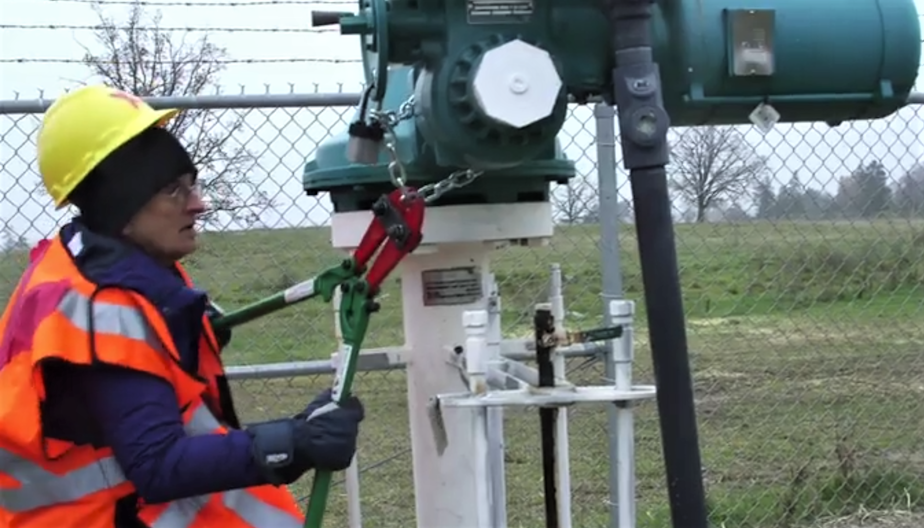Seattle women: 'Yes, we committed a crime, but we did it' to fight climate change
Seattle-area activists Emily Johnston and Annette Klapstein went to Minnesota in 2016 to shut down oil pipelines. Two years later, their trial begins.
Klapstein, a retired lawyer from Bainbridge Island, worries she won’t be back after her trial.
“If I go to prison, my husband is somewhat disabled and I’m also a large part of the support system for my very elderly mother,” she said. “Those things are concerning.”
But Klapstein said white people and older people like herself have an obligation to take these risks.
“What better thing to do with your retirement than attempt to salvage a habitable world for your children and grandchildren — I can’t think of anything better,” she said.
Emily Johnston said the long wait for trial has been punctuated by moments of alarm, as when members of Congress asked the U.S. Department of Justice to treat her like a domestic terrorist.
“I redid my will,” Johnston said. “I went to a friend’s house and told her what to do with my dog and what to do with my house and here’s what happens if I just get spirited away.”
Federal charges never came. Instead the two women face felony charges under Minnesota state law. They plan to tell jurors that civil disobedience is the only possible response to government inaction on climate change. The so-called necessity defense “is a plea that, yes technically we committed a crime, but we did it to prevent a greater harm,” Klapstein said.
They hope the Minnesota trial — and a children’s lawsuit that goes to trial later this month in Oregon — could create new momentum to address climate impacts.

Activists in other states have not been allowed to make climate change the central issue in their trials. Michael Foster shut down a pipeline on that day in 2016, but his trial took place in North Dakota.
“My judge said, ‘This is a trial about trespass, this is not about climate. I am not going to confuse the jurors with climate science information,’” Foster said.
The Minnesota Chamber of Commerce wanted Minnesota courts to follow North Dakota’s example.
“This trial is about significant crimes of damage to property, sabotage and trespass, which the defendants have already admitted to doing,” Laura Bordelon of the Chamber said in a statement. “Allowing this defense will embolden other activists to commit crimes to further their causes.”
Craig Stevens, of the business and labor group Grow America’s Infrastructure Now, said his group didn’t oppose the necessity defense. But he said he doesn't believe it would be persuasive. “I can’t imagine that it would be a broadly accepted defense simply because of the benefits of fossil fuels,” he said.
“These are people who are breaking the law, they are trespassing and a lot of what they’re doing is a danger not only to the public but also to themselves,” Stevens said.
Emily Johnston said the pipelines’ emergency shutoff valves are meant to be used by firefighters and other non-professionals, but she did lose sleep over the possibility of causing environmental harm.
“I did not think the action itself was in any way unsafe, but I do not trust the maintenance of these companies,” she said. In the end Johnston and Klapstein cut through chains to gain access, but didn’t shut off the pipelines themselves. The owner Enbridge did it remotely after a warning call from their group.
Even as oil companies signal support for certain carbon-pricing schemes, several states are increasing penalties for pipeline protesters. “More and more we’re seeing an appetite for legislation that would tamp down, I think, knock down the temperature of some of these protests,” Stevens said.
Michael Foster was the only “valve turner” to be sentenced to prison so far. He was sentenced to one year, but ultimately served six months in state prison in North Dakota for trespassing and felony criminal mischief.
Foster said the best part about serving his sentence was being offline.
“I read 65 books in prison,” he said. “I didn’t read that many books in college!” He said the social scene was challenging, though. Both prisoners and staff were baffled by his crime – and that he waited for arrest. “They almost, to a person, thought climate change was a hoax,” he said.
Foster was released from prison on August 1. He took a bus back to the Greyhound station in Seattle where his friends met him and took him out to eat. “There’s a Denny’s down there and the waitress said she’d never served so many veggie burgers,” he said.
Foster has lived with housemates in Wallingford since, riding his bike and abiding by the terms of his parole. He recently took part in a protest at Seattle’s cruise ship terminal but didn’t lock himself down. “I was wearing a Carnival polo and ballcap and handing out sno-cones made from the last glaciers,” he said.
Foster works one day a month as a drug counselor. “Then I live on pennies for the rest of the month so I can add as little pollution to the economy as possible.”
Todd Myers with the Seattle-based Washington Policy Center, a free-market think tank, said he’s not surprised that the activists come from the Pacific Northwest. “We have a history of radicalism and I think, unfortunately, an emphasis on the symbolic around here,” he said.
Shutting down the pipelines was just that — symbolic, he said, not effective policy.
“[Activists] think that we have to have sweeping political change, and that’s not going to happen,” Myers said. “Do things in your neighborhood, do things in your own life and that adds up to real difference.”
Foster agrees on that last point. No trips to Hawaii, for example.
And as tempting as it is to recoil from reports of drought, floods and wildfires, “This is not an asteroid hurtling towards the planet,” Foster said. The causes and solutions lie with people.




